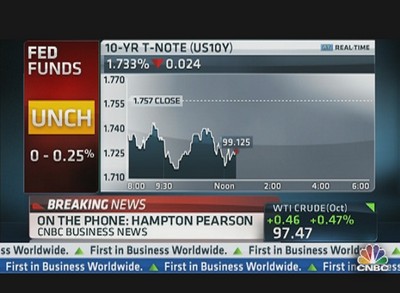So it looks like the Fed is going ahead with QE3 with spending $40 Billion a month and it is apparently "open ended". Below is a story on the recent news.
 |
The Fed said it will buy $40 billion of mortgages per month in an attempt to foster a nascent recovery in the real estate market. The purchases will be open-ended, meaning that they will continue until the Fed is satisfied that economic conditions, primarily in unemployment, improve.
Enacting the third leg of quantitative easing will take the Fed's money creation past the $3 trillion level since it began the process in 2008.
"The Committee is concerned that, without further policy accommodation, economic growth might not be strong enough to generate sustained improvement in labor market conditions," the Open Market Committee said in a statement.
In addition, the Fed said it will continue its program of selling shorter-dated government debt and buying longer-term securities, a mechanism known as Operation Twist. It also will continue its policy of reinvesting principal payments from agency debt and mortgage-backed securities back into mortgages.
The Fed left its funds rate unchanged at near-zero but offered one change in that regard, saying the rate would stay at "exceptionally low levels" until at least mid-2015.
"These actions, which together will increase the Committee’s holdings of longer-term securities by about $85 billion each month through the end of the year, should put downward pressure on longer-term interest rates, support mortgage markets, and help to make broader financial conditions more accommodative," the Fed statement said.
With a summertime rally pinned on hopes for aggressive central bank intervention — both in the U.S. and Europe — the Fed instead split the difference Thursday, offering a quantitative easing program the aggressiveness of which will depend on the strength of the recovery.
The stock market, which had been slightly positive prior to the decision, shortly after 12:30 p.m., advanced while bond yields edged lower.
"The language of its policy stimulus leaves us in little doubt that the central bank is trying hard to allay fears over the prospects for inflation, which it continues to see as a low likelihood, as well as its exit strategy," said Andrew Wilkinson, chief economic strategist at Miller Tabak in New York. "The Fed is going all out to say that easy money is here for a very long time. Will markets warm to its latest actions? We think so."
Though the Fed is ostensibly politically independent, the decision comes at a ticklish time with the presidential election less than two months away.
Washington conservatives have been critical of the central bank's money creation, which has caused its balance sheet to swell to $2.8 trillion. They worry that the growing money supply will lead to inflation, which has reared its head in food and energy prices but has remained tame through the broader economy.
Bill Gross, who runs bond giant Pimco, said the new round of easing would take the Fed's balance sheet up to nearly $3.5 trillion if the purchases continue for a year.
"That potentially is reflationary," he told CNBC. "We're just to have to see if it works."
Faced with an unemployment rate stubbornly above 8 percent and other indicators showing only halting signs of recovery, the Fed was pressed into action by a market worried that the nascent recovery was on wobbly ground and needed more stimulus.
Two previous rounds of QE had uneven effects on economic growth though they did manage to levitate stock prices by more than 100 percent from their March 2009 lows.
Fed Chairman Ben Bernanke will explain the central bank's decision further at a 2:15 pm news conference.





























































